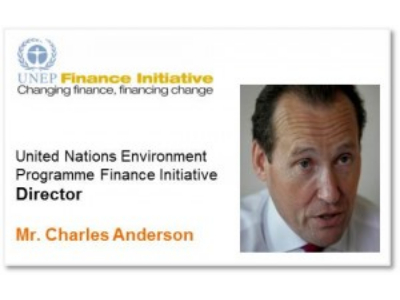The period 2014-15 offers a once-in-a-generation opportunity to accelerate the global transition to sustainable development, which comprises three interlocking and mutually reinforcing dimensions—economic, social and environmental sustainability.
While the global financial sector—spanning the banking, insurance and investment industries—has increasingly embraced the sustainability agenda over the past decade, far too little capital is flowing into a sustainable economy. Too much capital continues to be allocated to a resource-inefficient, carbon-intensive, polluting economy. Social and economic inequalities are widening, and communities and economies around the world are becoming highly vulnerable to disasters.
For example, the International Energy Agency estimates that an extra USD 36 trillion in clean energy investment is needed until 2050 to stabilise the effects of global warming. Oxfam reports that the 85 richest people in the world have the same wealth as the 3.5 billion poorest people—or half of the world’s population. The UN Secretary-General says that direct losses from natural disasters have been underestimated by at least 50% and are already in the range of USD 2.5 trillion this century—and that economic losses from disasters are “out of control”.
There is clear evidence of the urgent need to shift to a new growth model, and of serious deficiencies in the stewardship of the financial sector in this process. Accordingly, questions on the role of the financial sector in contributing to a sustainable economy are now more relevant than ever.
Format of the sessions
Two plenary sessions invited financial practitioners, financial regulators and UN officials to discuss the role of the financial sector and policy and regulatory frameworks in shaping a sustainable economy, building on the work by UNEP FI, its partners and other initiatives as part of the global sustainable finance agenda.
Session I: Does financial sector policy and regulation support sustainable development?
Looking at the rules of the game and how they are being redefined
The first session presented key intergovernmental, global policy processes currently being facilitated by the UN and examined the increasing uptake of sustainability issues in financial sector policy and regulation, and how this trend might contribute to building a financial system that supports sustainable development.
Global policy processes include the global climate agreement under the UN Framework Convention on Climate Change expected to be decided in Paris in December 2015, the Post-2015 Framework for Disaster Risk Reduction that will be produced at the 3rd UN World Conference on Disaster Risk Reduction in Japan in March 2015, and the UN Sustainable Development goals that will succeed the Millennium Development Goals and form part of the Post-2015 Development Agenda. Establishing global policy and regulatory frameworks often precedes, enables, shapes and catalyses policy and regulatory frameworks at the national level. This means that global policies often influence the financial sector and are therefore relevant to them.
Elements for the debate
- What is the fundamental role of financial policymakers and regulators in promoting sustainable development?
- Will the current approaches and trends be sufficient to align financial sector policy and regulation with broader public policy goals on sustainable development?
- What can be viewed as successful outcomes of these global processes?
- What would these mean to the financial sector?
Session II: The role of the financial sector in global policy processes on sustainable development
Is the financial sector doing enough and is its voice being heard?
The second session discussed financial institutions’ engagement examples that help shape sustainable policies relevant to the finance sector.
Establishing global policy and regulatory frameworks often precedes, enables, shapes and catalyses policy and regulatory frameworks at the national level. This means that global policies often influence the financial sector and are therefore relevant to them. What is less clear is the extent to which the financial sector itself has an inherent interest in ensuring that these global processes deliver successful outcomes. Furthermore, it is not clear how the financial sector can and should mobilise its own influence, skills and resources to help ensure successful outcomes.
This session discussed concrete UNEP FI members’ policy engagement actions, including their intervention in global processes en route to 2015—and beyond.
Elements for the debate
- Why are the current global policy processes on sustainable development relevant to the financial sector?
- What can be viewed as successful outcomes of these global processes? What would these mean to the financial sector
- How can the financial sector engage in the policy debate to achieve a step-change?


